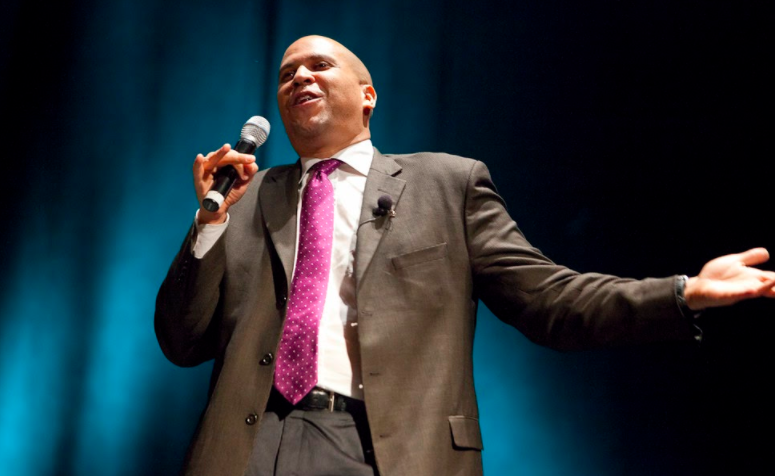Editor’s Note: This post is the first part in a series examining failed 2020 candidacies. See our other campaign postmortem posts: Julián Castro, Michael Bennet, Jay Inslee, Deval Patrick
by McKenna Donegan and Emma Willette
January 13th, forty-five minutes before we were supposed to begin our first day working for New Jersey Senator Cory Booker’s presidential campaign, we received the news notification that he had suspended his campaign. Perceived as a prospective presidential candidate during his time as mayor of Newark, even being referred to as “future president” by former Vice President Joe Biden it was shocking to hear he had officially decided to end his campaign. His likeability by the population is “undeniable” according to former Iowa Democratic Party chair Sue Dvorsky. Senator Booker has experience, and his message of unity seemed popular, but failed to exceed a 4% polling average. What went wrong for the Senator, and what will his next move be?
Cory Booker entered the race on February 1st, the first day of Black History Month, calling for love and unity in a deeply polarized time. Booker made his case to the electorate by emphasizing his biography, and campaigning on issues that he experienced as a kid growing up in New Jersey. His family had to overcome racist housing discrimination in New Jersey and as Mayor of Newark he saw the harm caused by uncompromising criminal justice laws. Booker’s campaign emphasized the reforms he had made in New Jersey such as education and policing, but his campaign lacked a defining issue in a race that was more focused on the divide between the progressive and moderate wings of the Democratic Party. Additionally, Booker’s campaign theme of universal love failed to strike a chord with progressive voters who flocked to Bernie Sanders and Elizabeth Warren who both promised a fight. On the other hand, moderate voters put their support behind Joe Biden and Pete Buttigieg.
A major reason for Senator Booker’s campaign failure; he didn’t stand out. This 2020 election cycle we saw the most diverse primary pool and Booker was unable to garner excitement over candidates like Kamala Harris and Pete Buttigieg. Because of this, Senator Booker did not have his “moment”, a time during the primary cycle where he received a surge of attention and support. This left him unable to win over the demographic pools he was expected to do the best with, those being party aligned voters, young people, and black voters. Being second choice for a majority of voters is a disadvantage according to Jonathon Bernstein which he explains in the book he co authored The Making of Presidential Candidates 2020. Lacking the die-hard factional support that candidates like Donald Trump and Bernie Sanders have leaves candidate like Cory Booker struggling to get anywhere near a majority of votes. Without this vibrant and explicit support, Booker also struggled to prove to the electorate that he was capable of achieving one of the main objectives in this 2020 election, that being defeating Donald Trump.
Money was also a huge playing factor in Senator Booker’s decision to drop. While he officially dropped in January 2020, he was very upfront in September of 2019 that if he didn’t reach fundraising goals, he would be dropping out. Senator Booker does not have the same grassroots support as a Bernie Sanders or Elizabeth Warren and in the current Democratic Party climate where accepting money from big corporations is essentially a death sentence, the fight for small donors gets harder and harder. Without the financial backing needed to continue his presidential campaign, and his reelection for senator in New Jersey coming up this year, he had to choose which battle to fight. And as he said, he entered the race to win, and that path to victory no longer seemed realistic.
Upon suspending his presidential campaign, Senator Booker returned to New Jersey to run his re-election campaign to defend his Senate seat in November’s election. Senator Booker plans to continue fighting for the plans he put forth in his presidential campaign such as, strengthening reproductive rights, tackling gun violence, and reforming the criminal justice system. On February 18th he received support from Speaker of the House Nancy Pelosi who publicly announced her support for Booker’s reelection campaign by saying, “Im counting on your immediate donation to re-elect my friend Cory Booker and kick Trump out of office”.
Senator Booker also has considerable support from Democrats in his home state, fifty-two of whom endorsed him last February. Cory Booker’s withdrawal from the Presidential race, following the departure of Julián Castro and Kamala Harris, left a considerably less diverse field of candidates. Senator Booker emphasized this point by saying, “there are more billionaires than black people” in the 2020 race. Now, with Iowa and New Hampshire behind us, two of the three remaining candidates of color, Deval Patrick and Andrew Yang have also both dropped out. Booker has not ruled out a role as VP, however he pledged to turn down the offer if it came from a man, citing the need for gender and racial diversity on all future White House tickets. If we don’t see Booker in a VEEP role in 2020, it’s likely we’ll see him return to his role as a New Jersey Senator.
